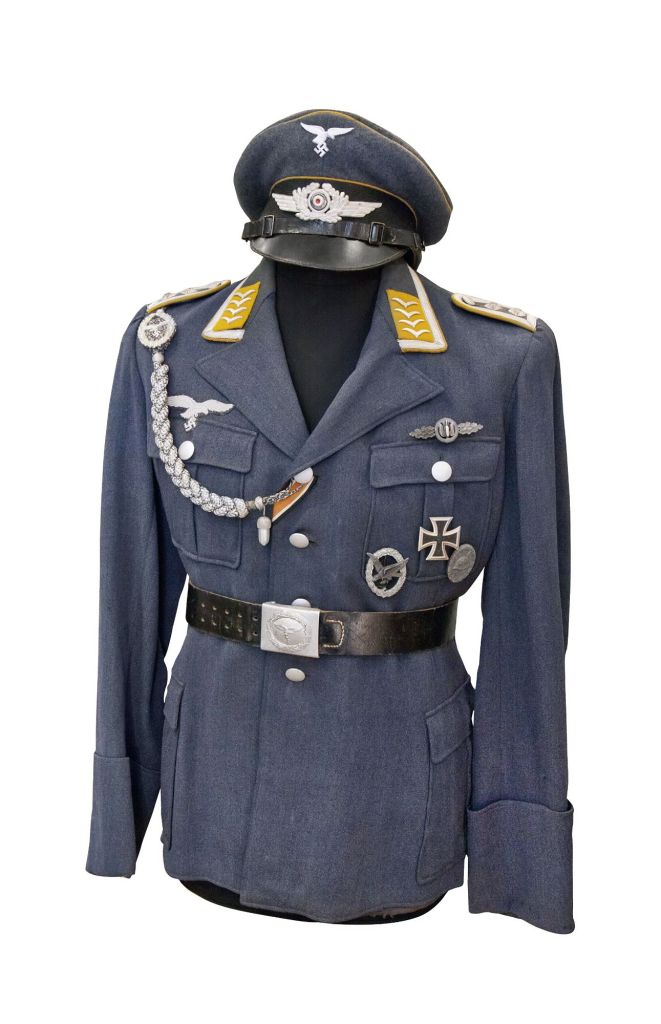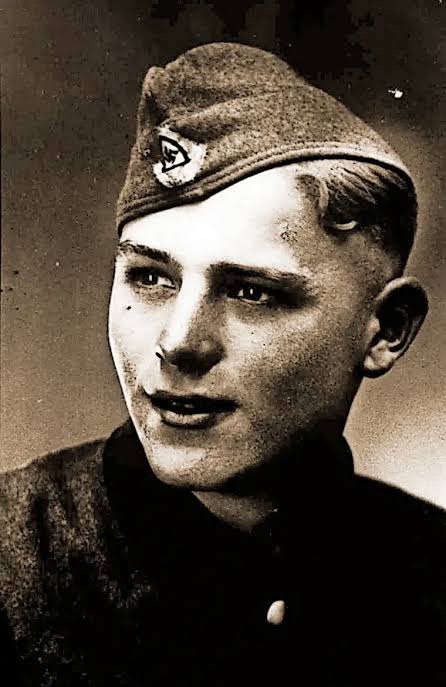I know I don’t take enough time to watch movies, not even the movies I need to watch. Case in point: this film was on my list for almost three years!

As the poster above states, this film is “darkly evocative.” It is even filmed in black and white, giving it the feel of film noir. The nod to this genre is apropos–a perfect fit for the subject at hand.
I have slowly been working my way through Masters of Death, a book about the SS Einsatzgruppen in World War II, which were basically, for lack of a better way of describing them, mobile death squads. While this film doesn’t deal with these groups, both the film and the book relate to the process of brutalization. The book presents a scholarly summary of the progression of brutalization, while the film simply allows it to play out on the screen. It is a theme one has to come to grips with if they want to understand what happened to thousands of German men during the period.
In his (WWI) autobiography, Manfred von Richthofen (aka. the Red Baron) touches on the line between sportsman and butcher. (Don’t misunderstand–he did not mean shooting for sport the way we understand it today.) He considered himself the former. As a soldier, he would fly his plane and shoot at the enemy in order to bring him down. Never more than one target at a time. His brother, he said, was “differently constituted.” “A butcher shoots for fun.” I don’t know much about Lothar von Richthofen, but his tendency toward “overkill” was even depicted in the much-maligned Disney film The Red Baron.
In The Captain, the line between sportsman and butcher is crossed by almost every character. For some, it comes naturally. Others are drawn into the heinous process.
Many people were surprised at how much they liked this film–especially given its failure at the box office. Perhaps it is “underrated.” The director is the German-born, American-trained Robert Schwentke. Perhaps that duality contributed to the uniqueness of this film.

The Captain is based on the true story of Willi Herold, a young soldier who becomes separated from his unit as they are in retreat during the final weeks of the war. On the run from the German military police, who consider him a deserter, he discovers a clean, pressed Luftwaffe (air force) Captain’s uniform in an abandoned car. He immediately sheds his filthy uniform and takes on the role of “Captain” Herold.
At this point in the war, “defeatism” is rampant among the German ranks, causing many to desert. From those that have deserted or become separated from their units, Herold begins amassing his own “task force,” beginning with the quietly submissive Freytag, who manages to resist the increasing brutality longer than the other men in Herold’s entourage. Freytag’s lines are few, and the viewer is encouraged to wonder what is going on inside his head.
Soon, the once-hunted Willi Herold has become a hunter, pretending that he is on a mission directly from the Führer to find and prosecute deserters with swift justice. Herold is a master actor, even convincing the staff of a prison camp for German deserters to do his bidding. (However, for anyone who is looking, his lies are revealed by a few extra inches of fabric at the hem of his trousers.)
In a poignant juxtaposition that viewers might miss if they are unfamiliar with German military history, condemned deserters are ordered to sing the Westerwaldlied as they are being marched toward the trenches that will become their graves. This song was a well-loved marching tune during the Second World War and would have undoubtedly served as a reminder of the camaraderie and patriotism they had sacrificed when they deserted. Though it is closely associated with the Nazi period, the lyrics are free of political doctrine, an ode to the beautiful Westerwald region and still popular amongst its inhabitants today.
When the prisoners have finished digging, they turn and face the men who are about to end their lives. Herold’s task force has set up a Flak gun for their murderous task. The condemned are expected to continue singing–though the upbeat, joy-filled Westerwaldlied has become a funeral dirge.
In English-language WWII films, we are used to seeing Germans brutalize Jews, Poles and Russians. In The Captain, however, they turn on each other. Some of Herold’s men were brutal to begin with, but others have been sucked into it–even the prison guard’s wife joins in taking shots at the fleeing men who have refused to dig graves for Harold’s task force.
After their tenure at the prison camp ends unexpectedly, Schnellgericht Herold (“Swift Judgement Herold”) finds its way into the city, shooting the mayor and taking over the finest house in scenes that depict what many were doing during the final days of the war: while hundreds of thousands of German men still hoped to preserve a shred of dignity and avoid captivity by fighting to their last breath, others gave up, found the most beautiful, busty women, and partied wantonly for days.
In a phrase that echoes the “let us eat and drink, for tomorrow we die” of the Bible, this became the mantra of many:
“Enjoy the war while you can, because peace will be terrible.”
I have to be honest, even though the same type of morbid celebration appears in the film Downfall, the scenes in The Captain are a bit more uncomfortable to watch because of the film’s overall tenor. I’m sure Schwentke intended it that way. Also, since I know many of my readers prefer to be warned ahead of time, during these later scenes, there is strong suggestion of an orgy, along with some bare breasts, buttocks and male genitalia. The nudity serves less of a sensual purpose than to contribute to the feeling that Herold is finally getting what he deserves.
But does he?
With the exception of animated films, most film credits are not worth watching. Here, however, the film’s dark sense of humor carries through to the very end, where Schnellgericht Herold drives around a modern German city, pulls up to the square and hassles people as the credits roll.
One cannot miss the German filmmaker’s commentary on his own people. As some reviewers said, and as I have mused before, every WWII production seems to have a token “good German.” English-language media in particular goes to great lengths to portray this “good German soldier” as an anomaly (Werner in All the Light We Cannot See, and Sebastián in the novel The Last Hours in Paris).
German writers and filmmakers often provide a more balanced view, because they know their own people. Their fathers, grandfathers and great-grandfathers lived the history that, to many of us, seems like little more than fiction.
These German WWII films (along with some other European films, actually) present a more true-to-reality cross-section of the German population and the German army. You can even find films that are willing to suggest that not everyone in the SS was a monster (for example, the Italian film My Honor Was Loyalty and the French/German/Romanian film Amen).

Robert Schwentke forgoes all that. Everyone is evil or becomes that way. Thanks to Herold, even Freytag, who seemed to quietly wrestle with his conscience throughout most of the film, is eventually brutalized.
What is truly shocking about Willi Herold is that he was only 21 when he was convicted and beheaded by the Allies in 1946. All of this had transpired a year and a half earlier. If the story in the film holds true, the Germans were unwilling to sentence him to death at his trial in 1945, so conflicted and chaotic were their circumstances at the time. According to the film, it was even suggested that he be released and sent back to the front because he had exhibited such leadership and military bearing.

In English-speaking countries, the film’s tagline is Follow the Leader. It is as if Schwentke is saying, Whatever made it so easy for these men to follow Herold is the same thing that made the nation follow Hitler. It has been argued by some that this need for leadership is a particular pitfall for Germans. Personally, I don’t believe that the desire for strong leadership (even if that leadership is destructive) is peculiar to Germans. I think that, given the right circumstances, it is a danger for any people group. (One has to look back into the past to understand the true magnitude of Germany’s desperation between 1916 and 1933.)
Unfortunately, in the last century (and perhaps longer), there was a Western narrative that went something like this: Germans are hopelessly brutal. It is their nature. Schwentke flirts with that in one particular scene where the head prison guard (Schütte) begs Herold to make the men stop fighting each other with fists and daggers. This is not German! Let’s find a more orderly way to do this. In response, Herold ties the guilty men’s wrists together and orders them to run away, only to order another prisoner to start shooting at them. It is a test of this prisoner’s loyalty, and becomes a game for the rest of the people present.
Is this tendency toward violence truly something that is peculiar to Germans? Were the Germans of the time different from other Germans? Sometimes I feel like humanity loves a good scapegoat, and it is so easy to look at the Nazi period as the epitome of evil, something none of us are capable of. Yet could this serve as a warning of what is possible for any people group if they find themselves in such unprecedented circumstances?
Final thoughts…
I gave the film a 7 out of 10 on IMDB, not because I didn’t think it was excellent but because I just really didn’t like the party scenes. Though they were not as graphic as they could have been, they felt awkward and almost had a randomness to them. There were a few other things that rubbed me the wrong way, but overall it is a well-made and thought-provoking film. Further, characters are as important to me in film as they are in books, and in spite of their nefarious roles, Willi Herold, Freytag, and even Schütte drew me in and contributed to the film’s intensity.
Naturally this film had a lot of violence, but it was not gory; a lot of the violence was off screen or done on a wide shot.
Even with a 7/10, I would recommend this film simply based on the fact that it is a well-made German war film, based on a true story, and unique in its genre.
Do you want to be informed about the latest on the Aubrey Taylor Books Blog? Posts happen between 1 and 3 times a month, and focus primarily on writing, German history, films, and books. We also love to introduce you to other authors in a broad range of genres, so drop your email below to stay up-to-date!

Excellent review, Aubrey! From what you describe, the party scenes do seem out of place for the film. Overall, though, it sounds like a grim but compelling story.
LikeLike
I always appreciate your comments, Priscilla! “Grim but compelling” is a great way of putting it. God bless!
LikeLiked by 1 person